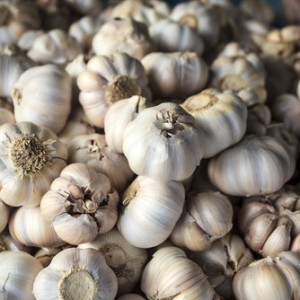Can Garlic Help Treat Lung Infections in CF Patients?
Written by |

 Garlic may help improve the symptoms of cystic fibrosis (CF) due to the presence of a chemical called allicin, which has been shown to kill opportunistic bacteria that are likely to cause lung infections in the thick, built up mucus of CF patients. The discovery that allicin may be an effective therapy to treat antibiotic-resistant bacteria was recently published in the PLoS One journal.
Garlic may help improve the symptoms of cystic fibrosis (CF) due to the presence of a chemical called allicin, which has been shown to kill opportunistic bacteria that are likely to cause lung infections in the thick, built up mucus of CF patients. The discovery that allicin may be an effective therapy to treat antibiotic-resistant bacteria was recently published in the PLoS One journal.
The study entitled “Garlic Revisited: Antimicrobial Activity of Allicin-Containing Garlic Extracts against Burkholderia cepacia Complex” focused on the proprieties of the chemical, which is naturally produced in garlic bulbs as a self-defense against plant pathogens present in the soil and water. By crushing raw garlic, allicin can be extracted.
The research, which was supported by the University of Edinburgh and the Biotechnology and Biological Sciences Research Council, suggested that allicin is also able to kill Burkholderia cepacia complex (Bcc) bacteria, which was discovered in the 1980s to be a cause of severe and transmissible lung infections in CF patients.
“The medicinal power of garlic has a rich history that dates back thousands of years but the chemical structure of allicin was only revealed in the 1940s,” said one of the authors of the study, Dominic Campopiano, from the University of Edinburgh’s School of Chemistry. “Our work suggests that modern methods should be used to further expand our knowledge of this enigmatic molecule and rejuvenate its potential applications.”
[adrotate group=”1″]
The approach of the investigators revolves around chemically modifying key enzymes of allicin to allow it to deactivate and interrupt the biological processes that are crucial to the pathogens’ cells. Bcc is a very adaptive plant and human pathogen, but has been poorly studied.
Despite the fact the spread of Bcc infections has been controlled through limited measurements, currently available treatments are limited and include the administration of three to four antibiotics. Therefore, the investigators believe that their finding may enable the development of allicin-based medication to be used in combination with other antibiotics.
“At a time when novel antimicrobial agents are urgently required, chemical and microbiological research has the potential to unlock the rich reservoir of antimicrobial compounds present in plants such as garlic,” added the co-leader of the study, professor John Govan, of the University of Edinburgh’s Centre for Infectious Diseases. “Allicin-containing compounds merit further investigation as adjuncts to existing treatments for infections caused by Bcc.”






